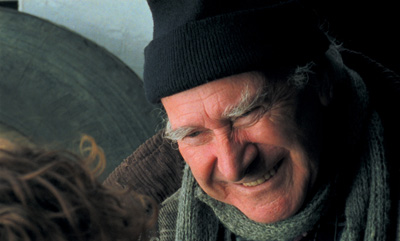|
Reviews of Recent Independent, Foreign, & Documentary Films in Theaters and DVD/Home Video
INTIMATE STORIES
The original Spanish title is Historias Mínimas, literally minimal
stories, implying small, everyday, almost irrelevant tales. In a
way, the film is exactly that: a portrait of small moments in the lives of
three ordinary, working-class people. Don Justo (Antonio Benedictis), a lonely old man, finds out
that Roberto (Javier Lombardo), a small-time salesman,
has seen his long-gone dog Badface in San Julián, a city 200 miles away.
Roberto has a crush on a single mother there. That same day, María (Javiera Bravo), a
poor
housewife and mother, learns she has been picked to participate in a live
television show in which she could win a prize.
From their Argentine village to San Julián, each has a different purpose:
finding the dog, surprising the client with a birthday cake for her child,
and getting to the show. The world will not end, the skies will not fall,
and nothing will really change if they don't get what they want. Yet their
aspirations become very important through the director's attention to
detail. Roberto's feelings for the client are made obvious by the way he
obsesses with the cake. María at first explains to her neighbor she can't
possibly appear on the TV show. If she leaves her small home unattended,
another relative will come, with his wife and children, and take it because she and
her husband have "no papers, nothing." Here, the film alludes to a constant problem in Latin American
rural areas, of natives owning land for centuries by common law, but with no
legal documents to stand against those who conveniently refuse to recognize
their rights.
Another example is the use of extreme close-ups. Don Justo is not exactly
congenial but grumpy, distant, and rigid in his ways. Yet he is, after all,
an 80-year-old man who has had a hard life, and who is living a harder life still,
and the camera reminds us of this by constantly closing in on his wrinkles,
his watery eyes, and the unease of old age he vividly projects,
making him movingly human.
Instead of intertwining the three stories more evenly, María seems forgotten
for about a third of the movie, while the film concentrates on the two men.
The ending, too, is a bit rushed, and the last scene, focusing on María,
isn't perhaps the strongest one, especially since she is the least seen.
However, the story is overall well acted. That many of the supporting
characters are portrayed by nonprofessionals is noticeable in only some of the
performances. The three leads, though, are natural and endearing. The
pace is pleasantly unhurried, and at the same time tense and complex in its
own way - like the people whose stories it tells. Roxana M. Ramirez
|
